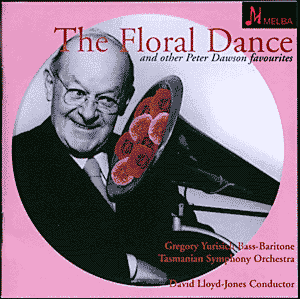BBC's Friday Night is Music Night is the nearest we
get nowadays to hearing songs of the late 19th and early
20th Century. Of the thousands of once-popular sheet music
songs that can still be found in forgotten piano stools only a sprinkling
of modern recordings exist, and these are generally with piano accompaniment.
Until now good orchestral settings have been thin on the ground. Peter
Dawson recorded a number of songs with orchestra on 78rpm records, but
their sometimes inferior quality has brought a need for modern orchestral
recordings. (It is perhaps surprising that the BBC have not released
items from their Friday Night programmes on the various BBC labels.)
An extra dimension is always given to song intended
for the piano when played by an orchestra. Orchestration of early British
songs was usually carried out by arrangers working internally for publishers
like Boosey and Chappell who realised their intrinsic promotional value
to enhance sheet music sales. The arrangements are rarely carried out
by the composers yet it is likely that a publisher would have always
sought their approval. The source of the excellent orchestrations for
this modern recording is not mentioned in the notes but they are presumably
traditional and are likely to have come from Boosey, Concord, or the
BBC library.
Peter Dawson was a well-known bass-baritone who
rose to fame in the twenties and thirties with many concert hall and
BBC performances. Apart from making records in the acoustic recording
days, he was remembered for providing early broadcasts for the Baird
television system in the thirties and generally did much to accelerate
sheet music sales in the popular songs he sang. It is reported that
thirteen million of his records were pressed, he was so popular.
The selection on this CD are well chosen: they cover
a wide range of composers and styles. The Floral Dance,
The Kerry Dance and On the Road to Mandalay
need no introduction. The orchestral arrangement for On the Road
to Mandalay with its florid bridging section between verses is charming
and calls for special mention. The Lost Chord is stunningly
powerful and reminds us of the British Empire and images found in Mike
Leigh's film, Topsy Turvey (on the lives of Gilbert & Sullivan).
There are many songs unfamiliar by name yet known in
tune. The songs are sung with good clarity and delivered at a comfortably
brisk pace. Lloyd-Jones keeps both singer and orchestra accurately in
step. Although I am thankful that Waltzing Matilda wasn't included
in the contents list, the absence of favourites like "Leanin'",
"Come to the Fair" and "Excelsior"
on this well-filled disc are noticed. It is an ideal CD to bring memories
of yesteryear flooding back, and is also interesting to hear works of
our forgotten British composers whose music regularly turns up in second-hand
bookshops.
Full lyrics are provided in the booklet. It is difficult
to decide from the contents list exactly who the librettist is and who
the composer: sometimes the librettist appears first, and sometimes
second. There are detailed notes on Dawson detailing his 1909-10 Australian
tour rather than the songs themselves. (This disc, I should add, is
produced in Australia).
Gregory Yurisich sings with style and precision.
He resembles a Robson in timbre, wide compass and powerful delivery.
Yurisich has much experience of Verdi and has a wide repertoire of grand
opera, making appearances with the Royal Opera and English National
Opera at Covent Garden and Edinburgh. His international tours include
Hong Kong, Paris, Brussels, Geneva, Melbourne, Sidney and Washington.
David Lloyd-Jones, who began in 1959 at the Royal
Opera House, Covent Garden needs no introduction: he founded Opera North
in Britain and has since worked with Welsh National Opera and appeared
at most major festivals.
The Melba label is new and provides a series of four
excellent discs (two by Bonynge). One is Massenet arias and another
is R. Strauss songs. A fourth is of British music of an earlier period
than this disc, "The Power of Love" and contains arias of
Balfe, Sullivan and W. V. Wallace see review.
Raymond Walker
Available in Australia and New Zealand. For UK availability, email:
Raywalker@macunlimited.net

